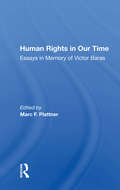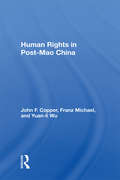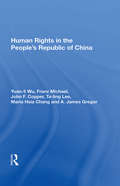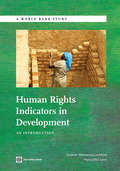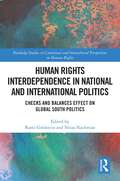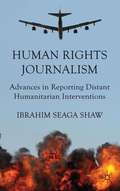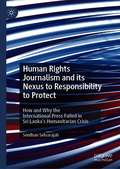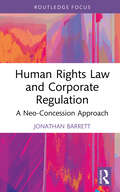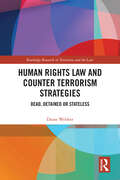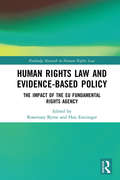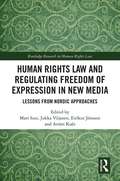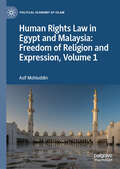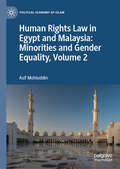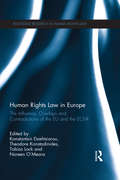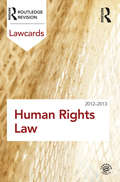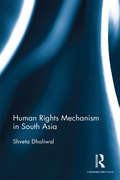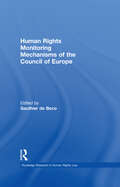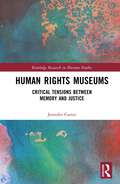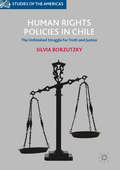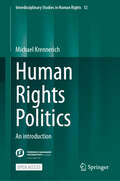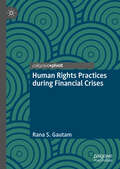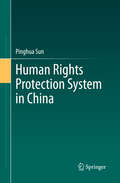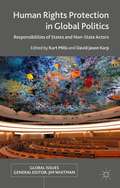- Table View
- List View
Human Rights In Our Time: Essays In Memory Of Victor Baras
by Marc F. PlattnerIn the past decade, human rights as a component of U.S. foreign policy has been the subject of intense debate. First brought to the forefront by President Carter, it has also turned out to be one of the most controversial aspects of foreign policy during the Reagan administration. Policymakers who attempt to cope with human rights issues are immediately confronted with questions not only about the basic purposes of U.S. foreign policy, but also about the essential nature of our political system; they are compelled to reflect upon the interrelationship between domestic public opinion and the pursuit of U.S. interests abroad. The complexity of human rights issues is reflected in the diverse contributions to this book. The authors examine the philosophical foundations of human rights, the lessons of history that are relevant to today's concerns, and contemporary policy. A concluding essay provides a critical analysis of the arguments made by the authors.
Human Rights In Post-mao China
by John F CopperThe concept of individual human rights in the People's Republic of China, as in all communist countries, is fundamentally different from that in the West. Even so, the record of the Mao Zedong years is generally acknowledged as dismal even in China. This book investigates human rights in China from a historical perspective but concentrates on the p
Human Rights In The People's Republic Of China: Human Rights In The People's Republic Of China, 1988-1989, No. 2-1991, 103 (Occasional Papers/reprints Series In Contemporary Asian Studies)
by Yuan-li WuThis book examines the effects that political institutions, the legal system, and economic policies have had on the human rights record in the PRC since 1949. The authors first address the problems of assessing political liberties in a nation that emphasizes economic over civil rights and that has traditionally valued collective rights over individ
Human Rights Indicators in Development: An Introduction
by Siobhan Mcinerney-Lankford Hans-Otto SanoHuman rights indicators are central to the application of human rights standards in context and relate essentially to measuring human rights realization, both qualitatively and quantitatively. They offer an empirical or evidence-based dimension to the normative content of human rights legal obligations and a provide means of connecting those obligations with empirical data and evidence, and in this way relate to human rights accountability and the enforcement of human rights obligations. Human rights indicators are important both for assessment and diagnostic purposes: the assessment function of human rights indicators relates to their use in monitoring accountability, effectiveness and impact, while the diagnostic purposes relates to measuring the current state of human rights implementation and enjoyment in a given context, whether regional, country-specific or local. This paper offers a preliminary review of the foregoing in the development context, and a general perspective on the significance of human rights indicators for development processes and outcomes. It is not intended to be prescriptive and does not provide specific operational recommendations on the use of human rights indicators in development projects. Nor does it advocate a particular approach or mode of integrating human rights in development, or argue for a rights-based approach to development. This paper is designed to provide development practitioners with a preliminary view on the possible relevance, design and use of human rights indicators in development policy and practice. It also introduces a basic conceptual framework about the relationship between rights and development, including in the World Bank context and surveys a range of methodological approaches on human rights measurement, exploring in general terms different types of human rights indicators and their potential implications for development at three different levels of convergence or integration.
Human Rights Interdependence in National and International Politics: Checks and Balances Effect on Global South Politics (Routledge Studies in Contextual and Intercultural Perspectives on Human Rights)
by Rami GoldsteinThis book offers a fresh approach to human rights by analyzing the role of institutional checks and balances, governmentalism and system's approach, intended for the prevention of human rights violations, the enforcement of human rights norms and rules, and important actors such as International Non-Governmental Organizations (INGO), and domestic Non-Governmental Organizations (NGOs).The book presents case studies that offer innovative, political, historical, and social perspectives on how the International Human Rights Regime (IHRG) is practiced. It critically examines the interpretation, inconsistency, and application of the human rights norms in the Global South, and shows how the national mobilization of human rights is directly affected by the interdependence existing between the national and the transnational levels.This book will be of key interest to scholars, students, and practitioners of human rights, and more broadly of comparative politics, international law, global governance, international and nongovernmental organizations.
Human Rights Journalism
by Ibrahim Seaga ShawShaw argues that journalism should focus on deconstructing the underlying structural and cultural causes of political violence such as poverty, famineandhuman trafficking, and play a proactive (preventative), rather than reactive (prescriptive) role in humanitarian intervention. "
Human Rights Journalism and its Nexus to Responsibility to Protect: How and Why the International Press Failed in Sri Lanka’s Humanitarian Crisis
by Senthan SelvarajahThis book takes a holistic approach by capturing the various perspectives and viewpoints concerning the theory and practice of Human Rights Journalism. Firstly, this book helps fill the epistemological vacuum present in Human Rights Journalism by proposing ‘pragmatic objectivity’ within the critical constructivist epistemology. Secondly, it defines the Human Rights Journalism-Responsibility to Protect nexus by identifying five key elements. Thirdly, it proposes a Human Rights Journalism-Responsibility to Protect conceptual model, which illustrates how an embedded human rights focussed media strategy can be designed. Fourthly, this book proposes two novel quantitative analysis tools called the ‘Framing Matrix’ and the ‘Multimodal Discourse Analysis Matrix’ that are equipped to deal with a big sample size over a long period of time. These tools are used to examine the practice of Human Rights Journalism and the typology of news stories of distant sufferings. Finally, it provides a scientific explanation for those in search of the answer to why one of the worst humanitarian crises in the world, which took place in Sri Lanka in 2009, did not create any global compassion or garner attention.
Human Rights Law and Corporate Regulation: A Neo-Concession Approach (Routledge Research in Human Rights Law)
by Jonathan BarrettThis book argues for an intensely humanist engagement with the company and presents a model of company regulation that is compatible with the protection, respect for and fulfilment of human rights.Dr Barrett provides a theoretical framing for corporate regulation in the context of human rights States. He argues that States which have ratified the fundamental human rights instruments should, on principle, exclude bodies corporate from the human rights ecosystem, except to the degree necessary to respect property rights of humans and human rights in business. He therefore develops a ‘neo-concession’ account of the corporation as the basis for a model of corporate regulation to protect human rights. The book outlines and recommends the principal features of a company under a neo-concession model, and the role of regulators in furthering the State’s human right obligations. It also delves into the potential issues of technological developments, including decentralised autonomous organisations, and the lessons policymakers can gain from First Nations’ approaches to business.This is a thought-provoking volume that will appeal to scholars in the disciplines of human rights law and corporate governance, as well as policymakers and regulators interested in regulating business for greater societal good.
Human Rights Law and Counter Terrorism Strategies: Dead, Detained or Stateless (Routledge Research in Terrorism and the Law)
by Diane WebberIn 2006, the United Nations urged Member States to ensure that counter terrorism policies guaranteed respect for human rights and the rule of law. This book demonstrates that, in many cases, counter terrorism policies relating to preventive detention, targeted killing and measures relating to returning foreign terrorist fighters have failed to respect human rights, and this encourages vulnerable people to be drawn towards supporting or committing acts of terrorism. Furthermore, in recent years, jurisprudence and public opinion in some countries have shifted from being at one stage more protective of human rights, to an acquiescence that some particularly draconian counter terrorism methods are necessary and acceptable. This book analyzes why this has happened, with a focus on the United States, United Kingdom, and Israel, and offers suggestions to address this issue. The work will be essential reading for students, academics and policy-makers working in the areas of human rights, humanitarian law, and counter terrorism.
Human Rights Law and Evidence-Based Policy: The Role of the EU Fundamental Rights Agency (Routledge Research in Human Rights Law)
by Han Entzinger Rosemary ByrneThe EU Fundamental Rights Agency (FRA) was established to provide evidence-based policy advice to EU institutions and Member States. By blending social science research with traditional normative work, it aims to influence human rights policy processes through new ways of framing empirical realities. The contributors to this volume critically examine the experience of the Agency in its first decade, exploring FRA’s historical, political and legal foundations and its evolving record across major strands of EU fundamental rights. Central themes arising from these chapters include consideration of how the Agency manages the tension between a mandate to advise and the more traditional approach of human rights bodies to ‘monitor’, and how its research impacts the delicate equilibrium between these two contesting roles. FRA's experience as the first ‘embedded’ human rights agency is also highlighted, suggesting a role for alternative and less oppositional orientations for human rights research. While authors observe the benefits of the technocratic approach to human rights research that is a hallmark of FRA’s evidence-based policy advice, they also note its constraints. FRA’s policy work requires a continued awareness of political realities in Brussels, Member States, and civil society. Consequently, the complex process of determining the Agency’s research agenda reflects the strategic priorities of key actors. This is an important factor in the Agency’s role in the EU human rights landscape. This pioneering position of the Agency should invite reflection on new forms of institutionalized human rights research for the future.
Human Rights Law and Regulating Freedom of Expression in New Media: Lessons from Nordic Approaches (Routledge Research in Human Rights Law)
by Mart Susi Jukka Viljanen Eiríkur Jónsson Artūrs KučsThe Nordic countries are well known globally for their high human rights standards and, at the same time, high degree of internet freedom. This edited collection reveals how the Nordic countries have succeeded in the task of protecting freedom of expression in the new media. It contains an overview of public policy choices and best practices of domestic online companies, which have the aspiration of finding global acceptance. Reviewing the topic of freedom of expression in new media within Nordic and Baltic countries, this book incorporates both general themes and interesting country-specific themes that will provide wider knowledge on the development of freedom of expression and media law in the online media era. A comprehensive analysis of regulation of online media, both at the level of legislation and application of law in courts and other authorities, are included. This book will contribute to the ongoing discussion as to whether there is a need to modify prevailing interpretation of freedom of expression. Human Rights Law and Regulating Freedom of Expression in New Media focuses on the multi-layered and complicated relationship between internet and human rights law. It contributes to the ongoing discussion regarding the protection of freedom of expression on the internet in the context of various doctrines of constitutional law, including the proliferation of constitutional adjudication. It will be of interest to researchers, academics, policymakers, and students in the fields of human rights law, internet law, political science, sociology, cultural studies, media and communications studies and technology.
Human Rights Law in Egypt and Malaysia: Freedom of Religion and Expression, Volume 1 (Political Economy of Islam)
by Asif MohiuddinThe discourse surrounding freedom of religion and expression in Muslim-majority countries is complex and multifaceted, shaped by a myriad of factors including cultural, political, and legal dynamics. This volume examines the complex interplay of these factors within the contexts of Egypt and Malaysia, offering valuable insights into the challenges and advancements in safeguarding these fundamental freedoms. From the diverse interpretations of Islamic principles to the varying legal frameworks and the influence of global events, such as geopolitical conflicts and terrorism, on human rights dynamics, this volume provides a comprehensive exploration of the complexities involved. Moreover, it delves into the historical, social, and political contexts that shape the protection and limitation of these freedoms, offering a nuanced understanding of the evolving discourse surrounding human rights in Muslim-majority countries. Through comparative analyses and discussions on the role of civil society and advocacy groups, this volume serves as an invaluable resource for scholars, policymakers, and activists seeking to deepen their understanding of the multifaceted realm of freedom of religion and expression in Egypt and Malaysia.
Human Rights Law in Egypt and Malaysia: Minorities and Gender Equality, Volume 2 (Political Economy of Islam)
by Asif MohiuddinIn Muslim-majority countries, safeguarding minority rights and advancing gender equality are vital components of the broader human rights discussion. Minority rights encompass various groups, including ethnic, religious, and linguistic minorities, who often face discrimination, marginalisation and unequal treatment within society. These challenges are rooted in historical, cultural and socio-political factors that shape legal frameworks and societal attitudes towards minority communities. Similarly, gender dynamics play a significant role in the human rights discourse in these nations, as women encounter various forms of discrimination and inequality, such as limited access to education, employment, and participation in decision-making processes. This volume explores the legal frameworks concerning minority rights and gender equality in Egypt and Malaysia, shedding light on the challenges faced by marginalised groups in these countries. It evaluates the effectiveness of legal instruments and mechanisms in addressing discrimination and promoting inclusivity within these societies. Furthermore, it examines laws, government policies and court rulings related to women’s rights, covering essential topics such as education, employment and political engagement. This volume offers valuable insights for policymakers, legal practitioners, academics and activists dedicated to understanding and advocating for human rights in these societies.
Human Rights Law in Europe: The Influence, Overlaps and Contradictions of the EU and the ECHR (Routledge Research in Human Rights Law)
by Kanstantsin Dzehtsiarou Theodore Konstadinides Tobias Lock Noreen O’MearaThis book provides analysis and critique of the dual protection of human rights in Europe by assessing the developing legal relationship between the Court of Justice of the European Union (CJEU) and the European Court of Human Rights (ECtHR). The book offers a comprehensive consideration of the institutional framework, adjudicatory approaches, and the protection of material rights within the law of the European Union and the European Convention on Human Rights (ECHR). It particularly explores the involvement and participation of stakeholders in the functioning of the EU and the ECtHR, and asks how well the new legal model of ‘the EU under the ECtHR’ compares to current EU law, the ECHR and general international law. Including contributions from leading scholars in the field, each chapter sets out specific case-studies that illustrate the tensions and synergies emergent from the EU-ECHR relationship. In so doing, the book highlights the overlap and dialectic between Europe’s two primary international courts. The book will be of great interest to students and researchers of European Law and Human Rights.
Human Rights Lawcards 2012-2013 (Lawcards)
by RoutledgeRoutledge Lawcards are your complete, pocket-sized guides to key examinable areas of the undergraduate law curriculum and the CPE/GDL. Their concise text, user-friendly layout and compact format make them an ideal revision aid. Helping you to identify, understand and commit to memory the salient points of each area of the law, shouldn’t you make Routledge Lawcards your essential revision companions? Fully updated and revised with all the most important recent legal developments, Routledge Lawcards are packed with features: Revision checklists help you to consolidate the key issues within each topic Colour coded highlighting really makes cases and legislation stand out Full tables of cases and legislation make for easy reference Boxed case notes pick out the cases that are most likely to come up in exams Diagrams and flowcharts clarify and condense complex and important topics '...an excellent starting point for any enthusiastic reviser. The books are concise and get right down to the nitty-gritty of each topic.' - Lex Magazine Routledge Lawcards are supported by a Companion Website offering: Flashcard glossaries allowing you to test your understanding of key terms and definitions Multiple Choice Questions to test and consolidate your revision of each chapter Advice and tips to help you better plan your revision and prepare for your exams Titles in the Series: Commercial Law; Company Law; Constitutional Law; Contract Law; Criminal Law; Employment Law; English Legal System; European Union Law; Evidence; Equity and Trusts; Family Law; Human Rights; Intellectual Property Law; Jurisprudence; Land Law; Tort Law
Human Rights Mechanism in South Asia
by Shveta DhaliwalShveta Dhaliwal teaches at the Rajiv Gandhi National University of Law, Punjab, Patiala, India. Her areas of specialisation are geopolitics, regional human rights systems, comparative political thought and international relations. She has published more than 40 research papers and presented over 150 papers in international and national conferences. She has an authored and three edited books to her credit. She is member of the Indian Political Science Association and the Indian Society of International Law and South Asian Foundation.
Human Rights Monitoring Mechanisms of the Council of Europe (Routledge Research in Human Rights Law)
by Gauthier De BecoThe book studies the human rights monitoring mechanisms of the Council of Europe. It provides an in-depth examination of six such mechanisms: the Commissioner for Human Rights, the European Committee for the Prevention of Torture and Inhuman or Degrading Treatment or Punishment (the CPT), the European Committee of Social Rights (the ECSR), the Advisory Committee on the Framework Convention for the Protection of National Minorities (the ACFC), the European Commission against Racism and Intolerance (ECRI) and the Committee of Experts of the European Charter for Regional or Minority Languages (the CECL). The human rights monitoring mechanisms of the Council of Europe seek to establish a permanent dialogue with governments to encourage them to better implement human rights treaties. They function principally through the use of national reports, on which basis they make recommendations, and may also visit or question states directly. The book looks at each mechanism in turn, discussing their composition, functions and working methods, as well as their relationship with other actors. It includes both a general discussion of the role of European human rights monitoring mechanisms as well as a comparative analysis of these mechanisms. The book aims to provide a clear understanding of the underlying approach of European human rights monitoring mechanisms and the challenges faced by them in terms of effectiveness. It will be useful for practitioners and students alike, especially those following courses in human rights or related fields.
Human Rights Museums: Critical Tensions Between Memory and Justice (Routledge Research in Museum Studies)
by Jennifer CarterHuman Rights Museums presents case studies that trace how calls for historical and social justice, and the commensurate rise of a rights regime have led to the emergence of a new museological genre: the human rights museum. Presenting innovative field research conducted in new and emerging human rights museums across Asia and Latin America, the book adopts a broad museological approach. It does so by including national and community museums, as well as public and private museological initiatives, within its purview. Drawing on in-depth case studies about museums in Taiwan, Japan, Paraguay and Colombia – all discussed within their political and cultural contexts – the book examines the paradigmatic shift that has occurred within the museum field in the wake of the larger global transformations that have shaped contemporary geo-politics over the last 50 years. The diversity of geographical and political contexts, and the attention to lesser-known institutions within the canon of English museum studies literature, presents readers with a valuable opportunity to learn more about innovative museological models in non-English-speaking and non-Western contexts. Human Rights Museums will appeal to academics, scholars and students of museum studies and related disciplines, and to museum professionals seeking to know more about the diverse and evolving roles of museums in contemporary society.
Human Rights Obligations of Business
by Surya Deva David BilchitzIn recent years, the UN Human Rights Council has approved the 'Respect, Protect, and Remedy' Framework and endorsed the Guiding Principles on Business and Human Rights. These developments have been welcomed widely, but do they adequately address the challenges concerning the human rights obligations of business? This volume of essays engages critically with these important developments. The chapters revolve around four key issues: the process and methodology adopted in arriving at these documents; the source and justification of corporate human rights obligations; the nature and extent of such obligations; and the implementation and enforcement thereof. In addition to highlighting several critical deficits in these documents, the contributing authors also outline a vision for the twenty-first century in which companies have obligations to society that go beyond the responsibility to respect human rights.
Human Rights Policies in Chile
by Silvia BorzutzkyThis book analyses Chile's "truth and justice" policies implemented between 1990 and 2013. The book's central assumption is that human rights policies are a form of public policy and consequently they are the product of compromises among different political actors. Because of their political nature, these incomplete "truth and justice" policies instead of satisfying the victims' demands and providing a mechanism for closure and reconciliation generate new demands and new policies and actions. However, these new policies and actions are partially satisfactory to those pursuing justice and the truth and unacceptable to those trying to protect the impunity structure built by General Pinochet and his supporters. Thus, while the 40th anniversary of the violent military coup that brought General Pinochet to power serves as a milestone with which to end this policy analysis, Chile's human rights historical drama is unfinished and likely to generate new demands for truth and justice policies.
Human Rights Politics: An introduction (Interdisciplinary Studies in Human Rights #12)
by Michael KrennerichThe book offers a comprehensive and clear introduction for students and those interested in human rights, written by a renowned human rights expert. It not only provides an introduction to the diversity of issues, actors and institutions in human rights policy and politics, but also offers assistance and suggestions on how the complex reality of human rights politics can be described and analysed with the help of political science and related disciplines. It deals with civil society engagement in human rights as well as state obligations and international efforts to protect human rights.This is an open access book.
Human Rights Practices during Financial Crises
by Rana S. GautamFrom the Great Depression in the twentieth century to the Great Recession in the twenty-first, systemic banking crises have been a recurring problem for both developing and developed countries. This book offers a human rights perspective on financial crises vis-à-vis low-income and least developed countries. It systematically analyzes government’s commitment to women’s economic rights and basic human rights during systemic banking crises. The book combines a wealth of data with rich theoretical arguments that weave together distinct but related bodies of literature from international development, human rights, and political economy.
Human Rights Praxis and the Struggle for Survival
by William T. Armaline Davita Silfen GlasbergAsserting a critical sociological perspective, Human Rights Praxis and the Struggle for Survival reveals the contested historical processes through which fundamental human needs are constructed as “rights” under international law, and how those rights are confronted by the ruling relations and crises inherent to contemporary global capitalism and the waning American hegemonic world order.Put simply, the book explores why human rights as a formal legal project has failed to deliver on guaranteeing human survival, let alone universal human dignity. Rather than stopping at critique, the authors propose a specific, materialist intellectual and political agenda for the preservation of collective human survival that can achieve the historically unique notions of common humanity and human emancipation. The authors build on previous work, further developing the sociology of human rights as a distinct field at the intersection of Social Sciences and International Law. They take on several provocative theoretical debates, such as those over connections between racism and capitalism; the existence of a global or “transnational” police state; the control, growth, and exploitation of migrants/migration; and the complex relationship between political repression and various forms of domination.Human Rights Praxis and the Struggle for Survival offers critical analysis of contemporary politics and options for students, scholars, organizers, and stakeholders to grapple with some of the most pressing social problems of human history.
Human Rights Protection System in China
by Pinghua SunIn recent years, more and more scholars in the world feel interested in the topic of human right protection status in China. This book hopes to serve as a window through which its readers will have a better understanding of theory and practice of human rights protection in the Chinese context. The book systematically introduces the dynamic development and progress of human rights protection in China, attaching great importance to the first white paper on Human Rights in China, "The state respects and guarantees human rights" included in the Constitution, National Human Rights Action Plan of China, and then putting forth fundamental principles to achieve international human rights standards and specific measures to improve human rights protection standards in China. Then the book further discusses "Foundations of Human Rights Guarantee in Contemporary China", "Human Rights, Culture and Their Reconstruction in the Chinese Context" and "Socialist Legal System with Chinese Characteristics". Then, a final chapter is dedicated to the topic of "Judicial Protection System of Human Rights in China". In appendices, four important documents on human rights in China, as well as a list of the author's major articles and works in the past 10 years are provided.
Human Rights Protection in Global Politics
by David Jason Karp Kurt MillsHuman Rights Protection in Global Politics analyzes the contemporary human rights responsibilities of state, non-state and international actors. It includes an interdisciplinary set of perspectives based in international relations, politics, law and philosophy. The book seeks to understand but also to critique and to move beyond the contributions of, firstly, the 'respect-protect-fulfil' tripartite division of human rights responsibility, and secondly, the more recent 'Responsibility to Protect' policy framework. It rejects approaches that treat duties to respect, not to harm, or not to violate human rights as entirely constitutive of the responsibilities that global actors have. The book's contributors engage in dialogue with each other, and sometimes even disagree. However, they are unified in their attempt to paint a more complex picture than is currently available about the nature of human rights protection and various global actors' responsibility for it. "
